Kuku Sabzi (Persian Herb Frittata)
Mar 17, 2024, Updated Jan 17, 2025
This post may contain affiliate links.
Kuku Sabzi, a Persian herb frittata, is a simple and flavorful dish made with fresh herbs and spices. It’s perfect for Persian New Year (Nowruz) or as a complete meal year-round. It’s usually served as a wrap with lavash but you can also enjoy it with rice or simply on its own.
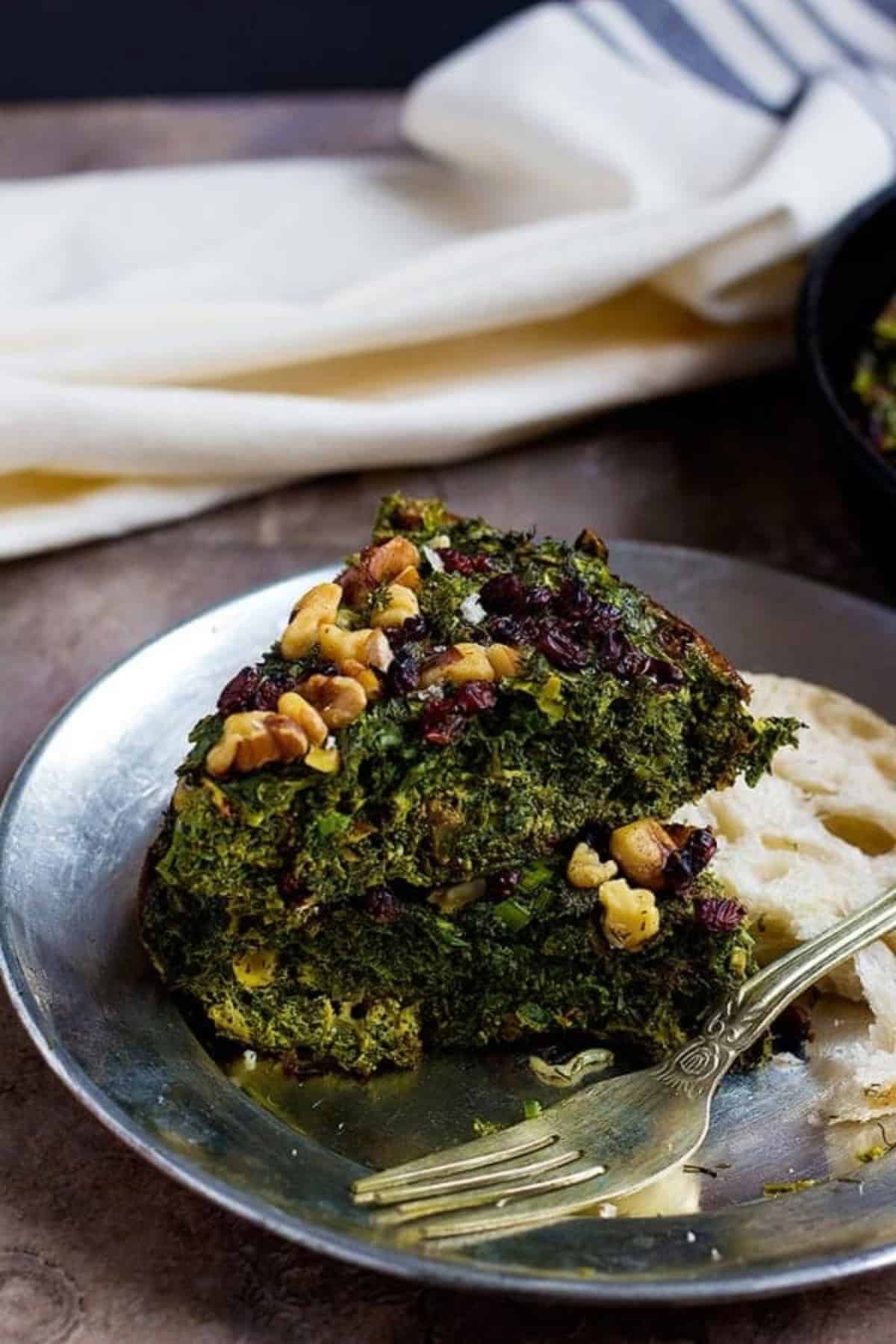
As the Persian New Year and spring approach, we try to bring a lot of green into our food as it represents life and rebirth. Some of the dishes we make include ash reshteh (Persian noodle soup) and sabzi polo (herb rice), usually served with stuffed fish.
Kookoo Sabzi is a dish that captures the spirit of late winter. Filled with fresh herbs, walnuts, and barberries, it’s a perfect way to wrap up the season.
Table of Contents
What Is Kuku in Persian Cuisine?
Kuku, or kookoo, is a versatile category of Persian dishes typically made with eggs and a variety of vegetables, herbs, or even legumes. It can be served as an appetizer or main course. Other popular kuku variations include kuku morgh (chicken kuku), kuku sibzamini (potato kuku), and kuku kadoo (zucchini kuku).
What Is Kuku Sabzi?
Kuku Sabzi, also known as Persian herb frittata, is a popular dish in Iranian cuisine. The word “kuku” refers to an egg-based dish, while “sabzi” translates to greens or herbs. Unlike a traditional frittata, Kuku Sabzi uses minimal eggs, focusing instead on an abundance of finely chopped herbs, which lend the dish its vibrant green color.
Ingredients
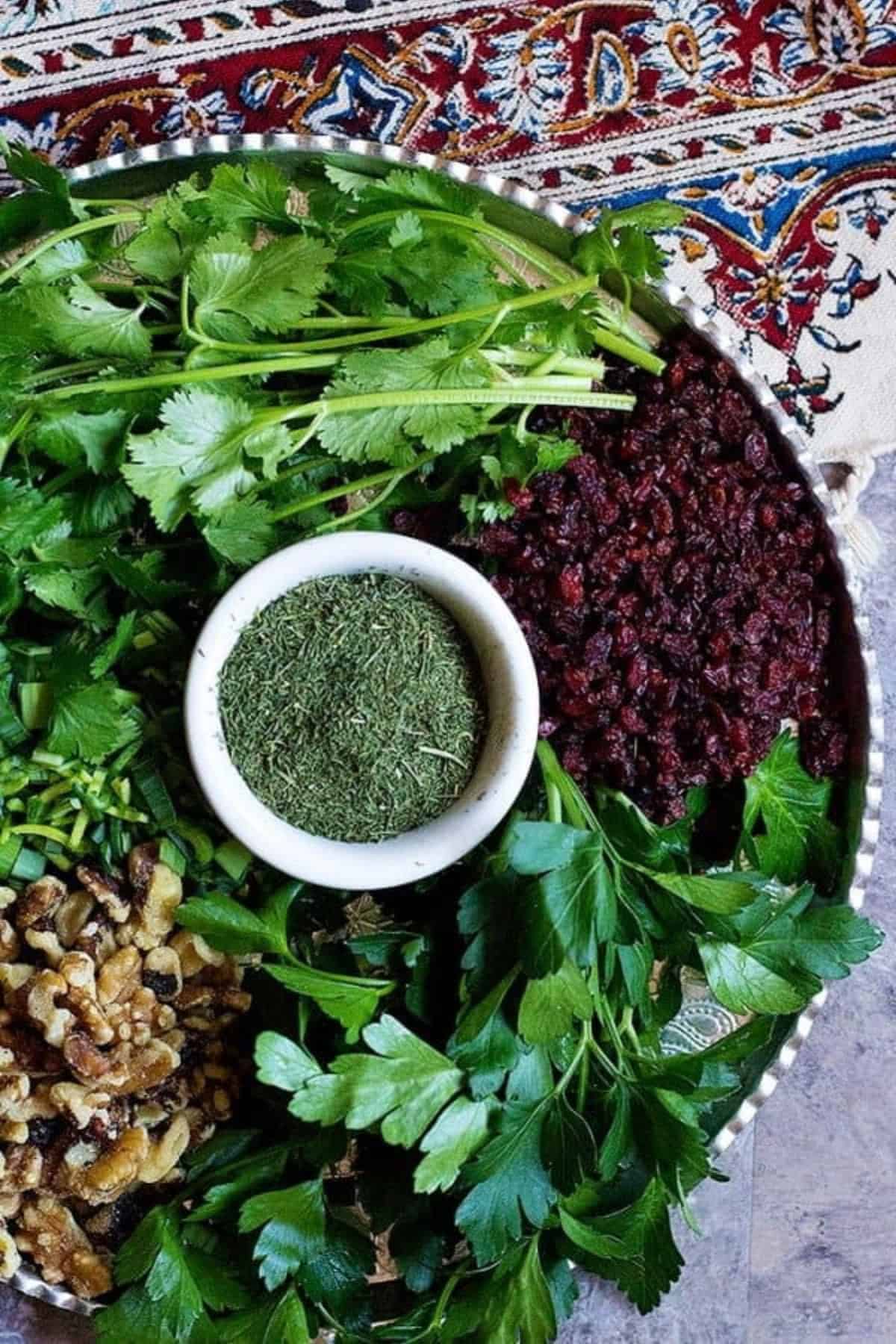
- Herbs: For this recipe use parsley, cilantro, dill and leeks. Make sure all the herbs are washed and dried thoroughly before chopping them.
- Eggs: Eggs bind the ingredients together.
- Spices: You need turmeric, salt and pepper. The spice combination us quite simple since we want the flavors of the herbs to shine through.
- Walnuts: Optional, but add a delightful crunch.
- Barberries: Optional, but provide a tangy burst of flavor.
How to Make Kuku Sabzi
Step 1: Prepare the Herbs
Wash and dry all herbs thoroughly to remove any dirt. Finely chop the parsley, cilantro, dill, and leeks (only keep the leaves and tender stems). Place them in a large mixing bowl.
Step 2: Mix the Batter
Crack the eggs into the bowl with the herbs. Season with the turmeric, salt, and black pepper and add the flour. Mix well until the egg mixture is cohesive. Fold in walnuts and barberries if desired.
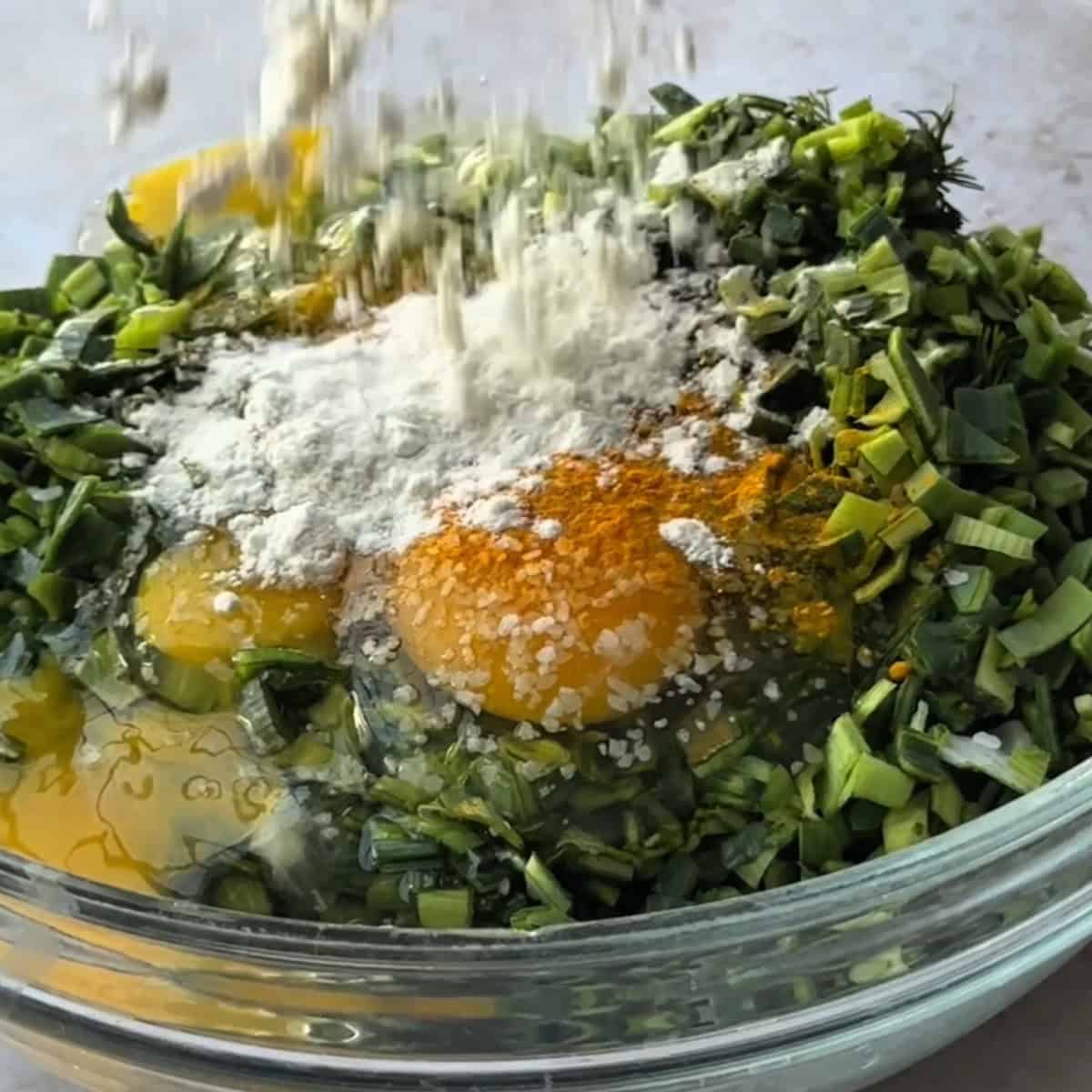

Step 3: Cook the Kuku
Heat 2-3 tablespoons of olive oil in a nonstick pan over medium-high heat. Once the oil is hot, pour the kuku batter into the pan and spread it evenly using a rubber spatula. Place a paper towel on the lid to catch the moisture and cover the pan. Cook for 10 minutes undisturbed.
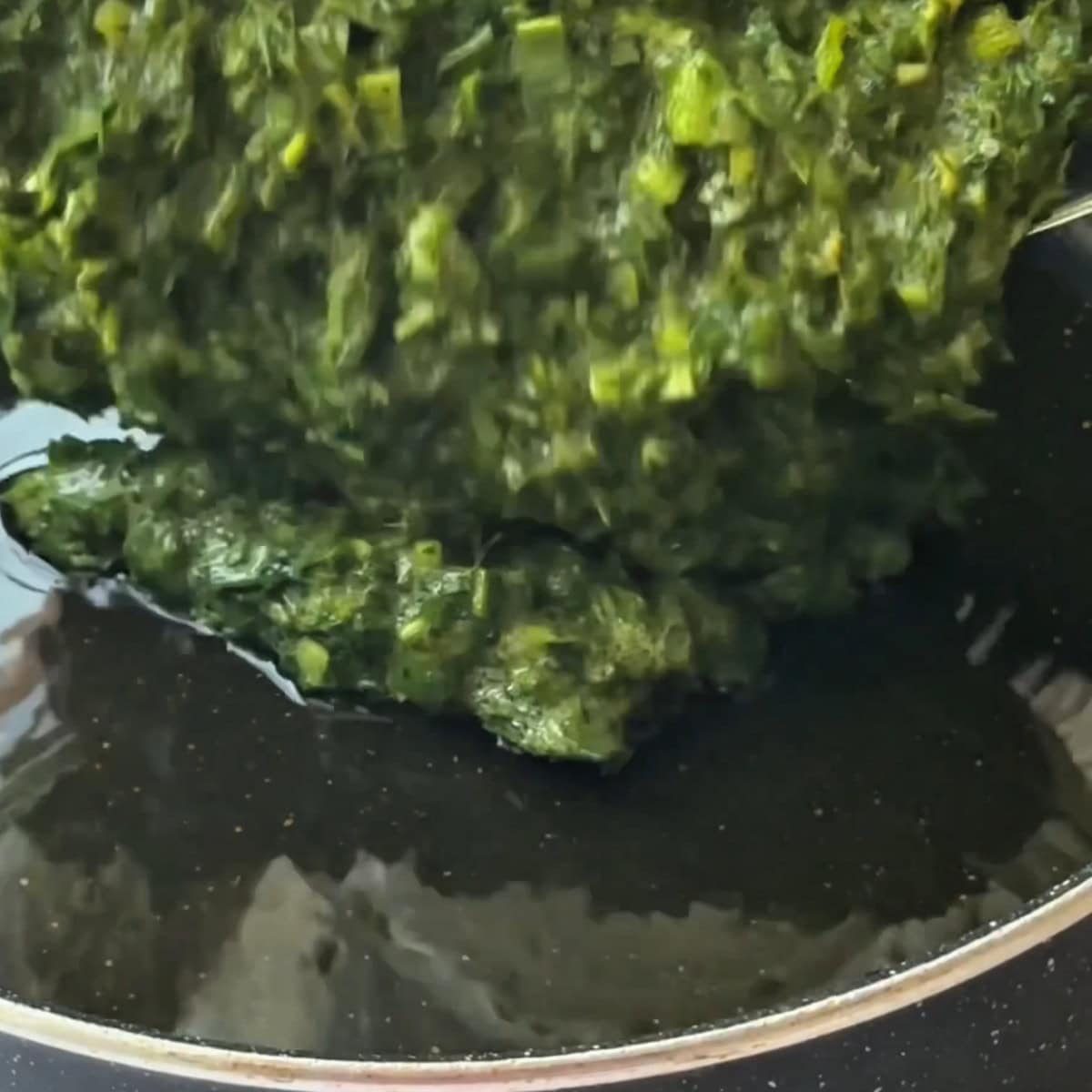
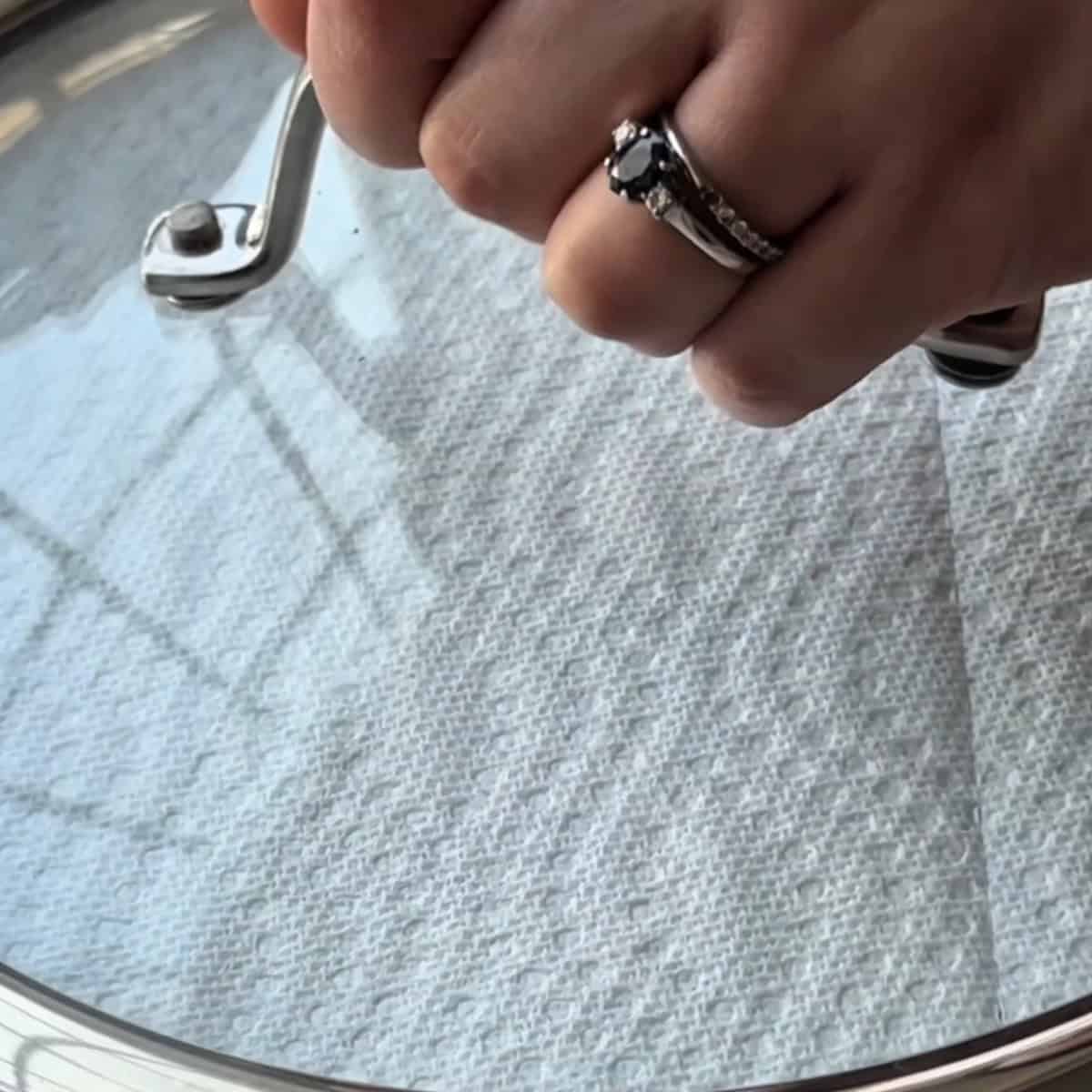
Alternatively, you can spoon in the mixture to make individual patties instead of pouring all the batter into the pan at once.
Step 4: Flip and Finish
Check if the top of the kuku is dry. Place a large plate over the pan and carefully flip the kuku onto the plate.
Add a bit more oil to the pan, slide the kuku back in, and cook on medium heat for another 10-15 minutes without the lid.
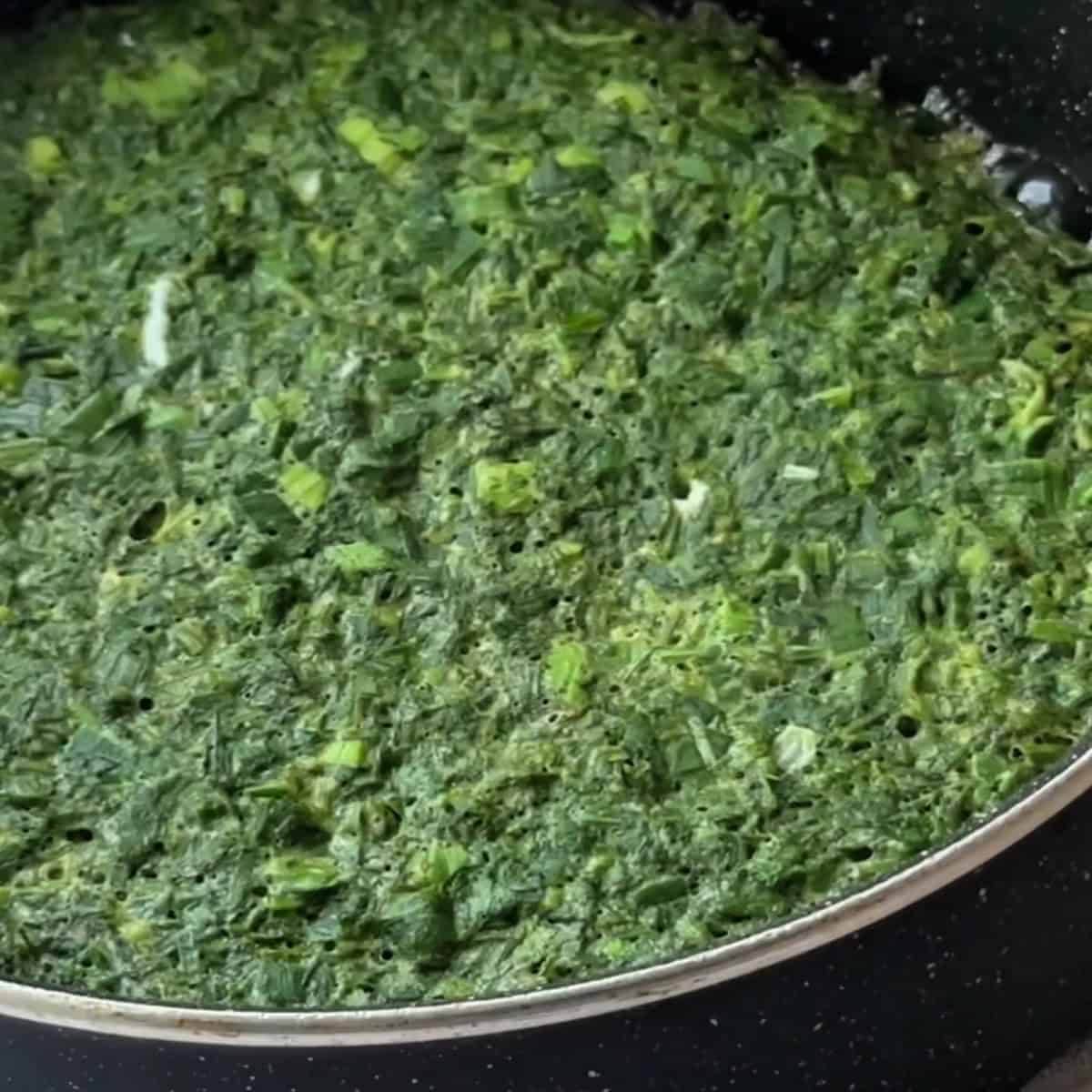
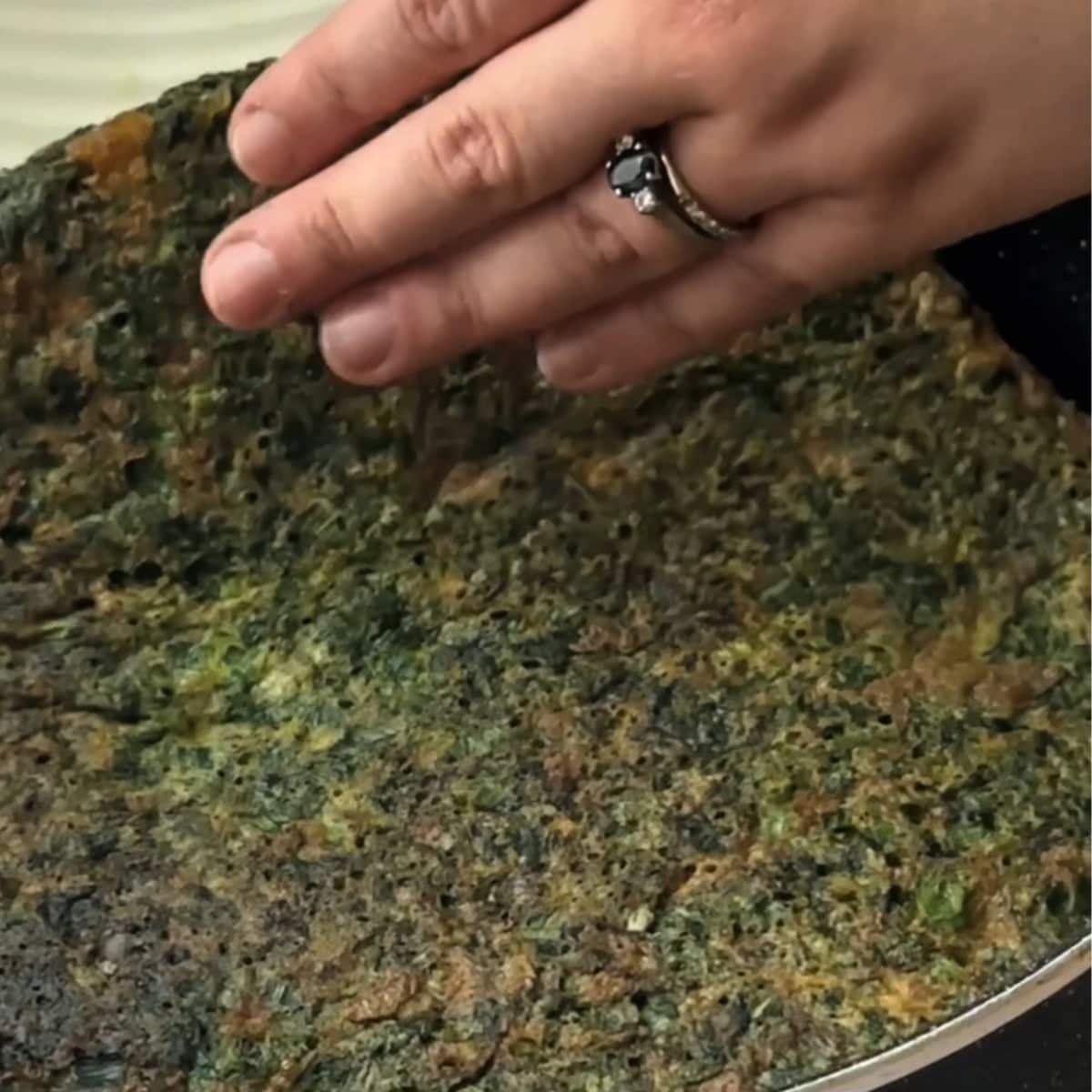
Step 5: Serve
Transfer the kuku to a serving platter and cut into wedges. Serve warm or at room temperature.
Serving Suggestions
- With Persian Rice: Pair Kuku Sabzi with Persian herb rice or plain basmati rice.
- With Bread: Serve with traditional Persian bread like pita or lavash, barbari, and sangak.
- With Sides: Add a side of yogurt, fresh tomatoes, radishes, and pickles for a complete Persian meal.
Recipe Tips
Use Fresh Herbs: Freshly chopped herbs are key to achieving vibrant flavors and color. You can use a salad spinner to dry the herbs.
Adjust Thickness: Use a smaller skillet for a thicker kuku or a larger pan for a thinner version. Another way to cook it is to spoon the mixture into the oil, using about two tablespoons per patty, and cook each side for 5 minutes until golden and cooked through.
Control Moisture: Ensure the herbs are thoroughly dried before chopping to prevent a watery mixture.
Experiment with Add-ins: Walnuts and barberries are optional but elevate the dish with added texture and flavor.
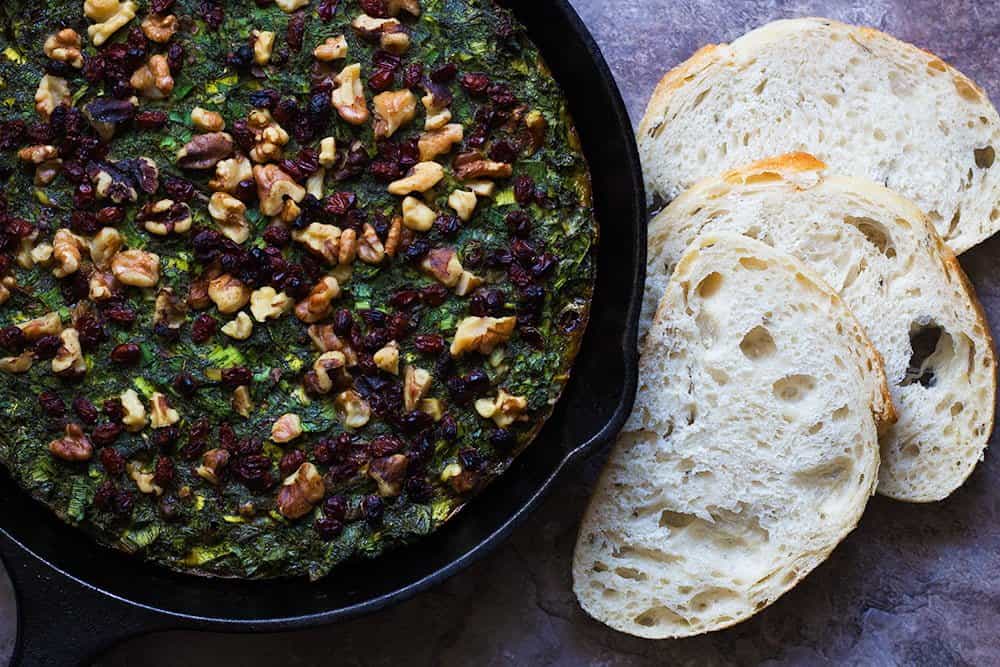
Variations and Substitutions
Herbs: Stick to parsley, cilantro, dill, and leeks for the perfect kuku. However, you can add green onions for an extra kick.
Baked Kuku Sabzi: You can also bake the mixture in a oven-safe dish at 375°F for 25-30 minutes. Make sure to coat the dish with cooking spray or olive oil before baking.
Storage
Store the leftovers in an airtight container for up to 4 days. I don’t recommend freezing kuku sabzi because the texture and flavor would change when thawed. You can reheat kuku sabzi in the microwave or in a pan over medium heat.
Frequently Asked Questions
Kuku has fewer eggs, just enough to keep the ingredients together, whereas frittata has more eggs compared to the rest of the ingredients. Also, sometimes, the ingredients that go into frittata are cooked or seared separately and mixed with eggs, but in kuku, everything is mixed and cooked at the same time.
It’s best to stick to the traditional herb mix for authentic flavors, but green onions can be added for extra flavor.
Yes, you can simply spoon the batter into the hot oil, like fritters. Cook for 4 to 5 minutes on each side until fully cooked.
Absolutely! Prepare the mixture a few hours in advance and refrigerate it. Cook it fresh when ready to serve.
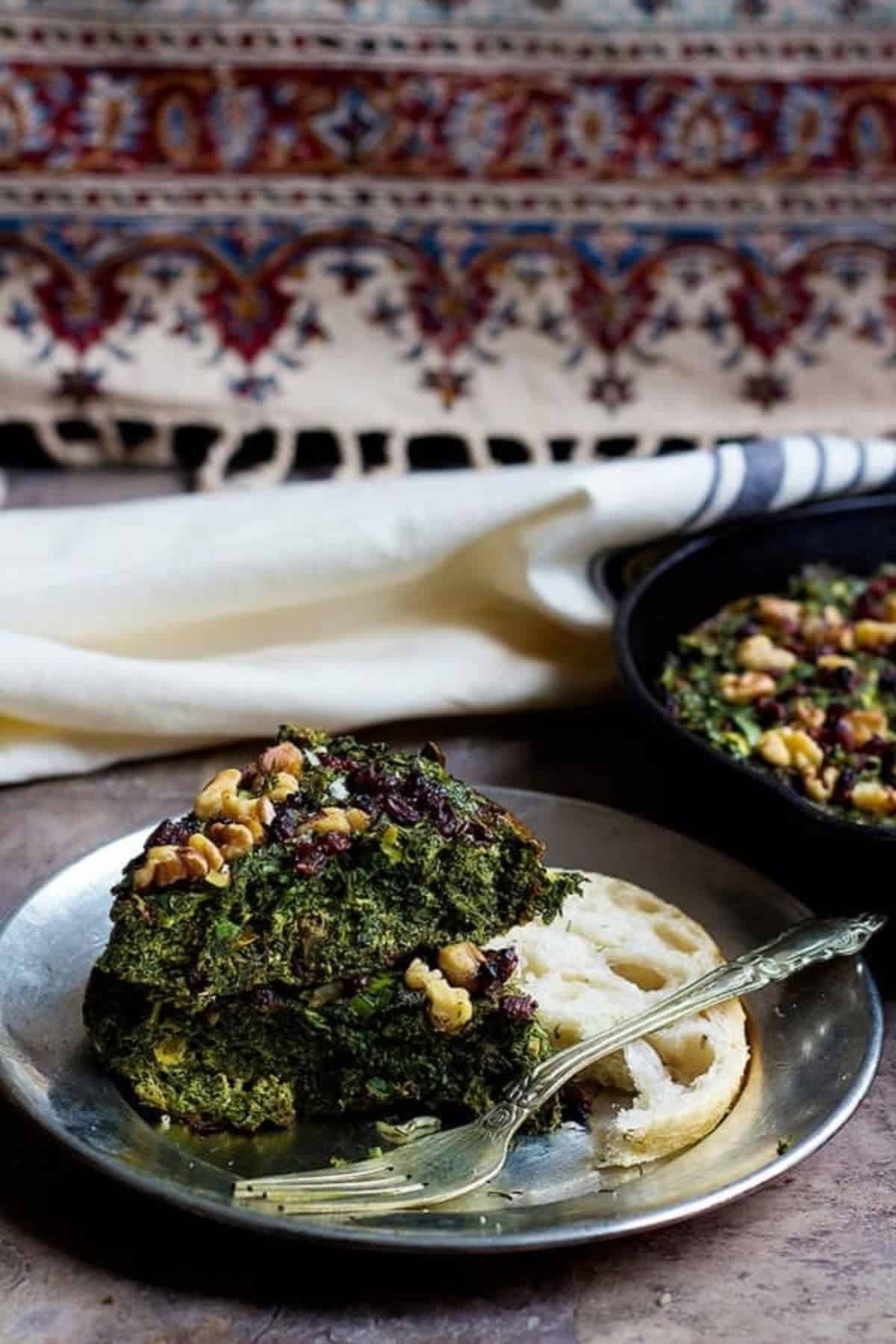
More Persian Recipes
Persian Recipes
Sabzi Polo (Persian Herb Rice)
Persian Recipes
Dill Rice with Peas (Persian Style)
Persian Recipes
Ghormeh Sabzi – Persian Herb Stew (Video)
Persian Recipes
Ash Reshteh (Persian Noodle Soup)
Did you make this recipe? I’d love to hear about it! Please comment and leave a 5-star🌟 rating below. You can also follow us on Instagram, Facebook, Pinterest or subscribe to our newsletter to get a free e-Cookbook!
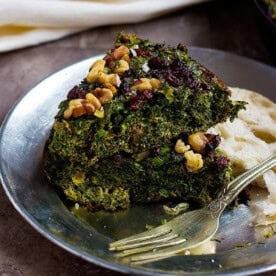
Kuku Sabzi (Persian Herb Frittata)
Ingredients
- 1 cup Parsley , chopped
- 1 cup Cilantro , chopped
- 1 cup Fresh dill , chopped
- 1 Leek , chopped, only the green part
- 4 Large eggs
- 1 tsp Kosher salt
- 1/4 tsp Black pepper
- 1/4 tsp Turmeric
- 1 tbsp All purpose flour
- 1/3 cup Walnuts , optional
- 1/3 cup Barberries, optional
- 4 tbsp Olive oil
Instructions
- Place the chopped parsley, cilantro, dill, and leek in a large bowl. Add in the eggs, followed by salt, pepper, and turmeric. Mix to combine, and make sure all the ingredients are sticking together. If the mixture isn't sticking together, add another egg.
- If desired, add in the chopped walnuts and barberries and give it a stir.
- Heat 3 tablespoons olive oil in a large (10 to 12 inches) nonstick pan over medium high heat. Once the oil is hot, transfer the kuku batter into the pan and spread evenly using a spoon or rubber spatula.
- Place a few pieces of kitchen paper towel on the pan and top with the lid. Let it cook undisturbed for 10 minutes.
- Remove the lid and paper towel, and check to see if the surface of the kuku is dry. If so, carefully place a large plate on the pan and flip the kuku.
- Add 1 tbsp oil to the pan. Transfer the kuku to the pan and cook on the other side for another 10-15 minutes. There is no need to cover the pan.
- Transfer to a serving plate and slice before serving.
Video
Notes
- You can use a smaller pan for thicker kuku, but I like mine pretty thin, so I use a larger one.
- The amount of eggs used in this recipe depends on the size of the eggs. You need enough eggs so that all the herbs are smothered with the egg and are sticking together. Don’t use too much egg, as the frittata should stay green and not yellow.
- If you are not comfortable with flipping the kuku, you can spoon the mixture into the oil using about two tablespoons per patty. Cook each side for 5 minutes until golden and cooked through.
Nutrition
Nutrition information is automatically calculated, so should only be used as an approximation.
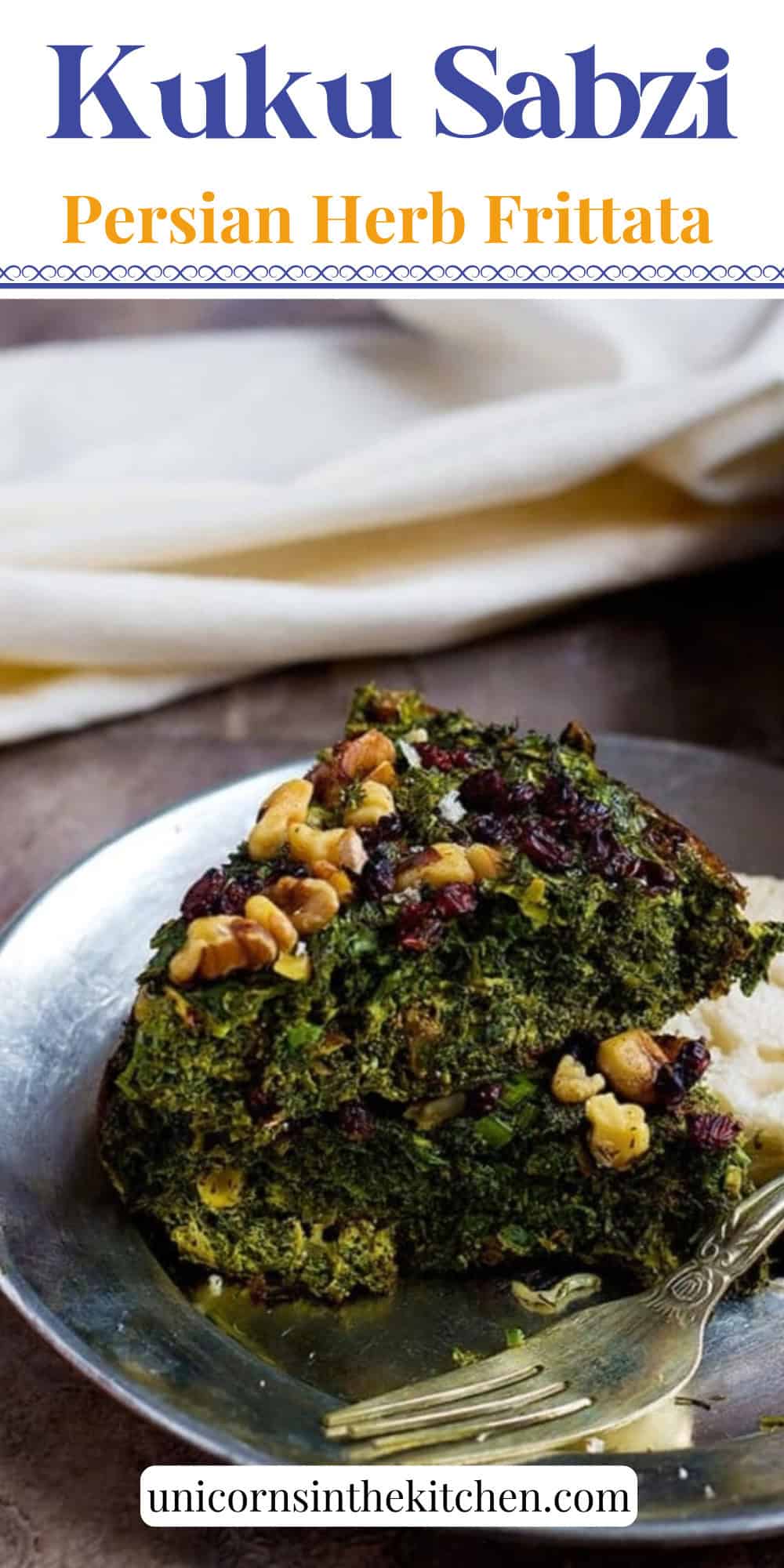

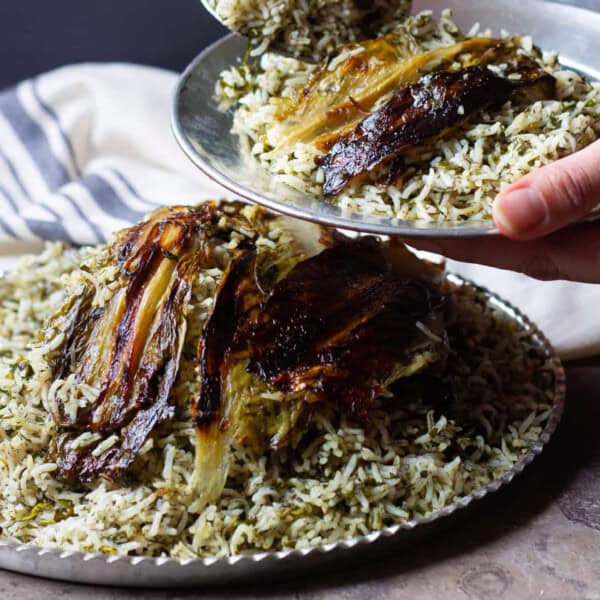


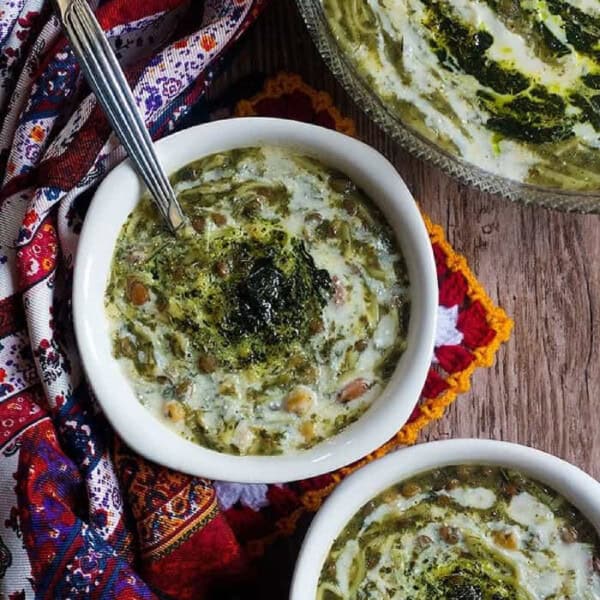









Frittata is one of our favorite food!
I love frittatas and this is no exception! Thank you for this awesome recipe!
I am thinking of making your kuku sabzi for a party I’m having in June. I have a couple of questions:
Can I use a a different nut in place of walnuts? (One of my guests is allergic.)
Is it possible to make it ahead and freeze it?
Thank you!
The answer is yes to both your questions! Just reheat it in the oven before serving 🙂
Excellent, thank you! Do you have a suggestion for what nuts might go nicely with it?
I’m using dried Kuku herbs. Can you tell me the proportions of the other ingredients to the dried herbs? Also, how long do the dried herbs last if kept in a cabinet.
Dried herbs keep between 6 months to a year in a cool dry place. soak 2 to 2.5 cups of dried herbs in water, drain and mix with the ingredients mentioned in the recipe. Hope you enjoy this.
Tomorrow I am going to cook Kuku Sabzi with my students in class. I will use your recipe to present kuku Sabzi to them.
BTW the photos look amazing!
Thanks you Mahya, hope you all enjoy it <3
Oh my goodness, what a beautiful tribute to all the herbs and spices! I can’t wait to try this delicious recipe, thank you so much for sharing.
I’m glad you like it Tania!
Ohh that frittata sounds lovely! All those herbs must make it so flavorful!
Thank you Liz! It is very flavorful!
Sounds and looks like a very interesting version of frittata, would really love to try it.
Thank you! Hope you love it!
This is so pretty! I love that it’s so full of herbs – it sounds so delicious.
Thanks Kate!
That frittata sounds absolutely delicious, love that you can use all different herbs in it!
Yes! The best way to use up all herbs!